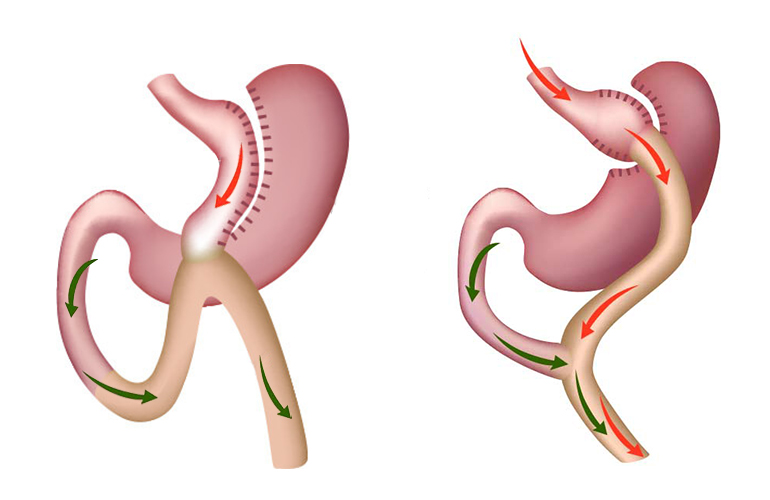Gastric Bypass Surgery
This surgery involves creating a small stomach pouch and connecting it directly to the middle portion of the small intestine, bypassing a large part of the stomach and the upper portion of the small intestine. This drastically reduces the volume of the stomach and the calories the body can absorb. Gastric bypass is typically performed laparoscopically, which involves making small incisions and using miniature instruments, leading to quicker recovery, less pain, and fewer complications compared to open surgery.
Gastric Bypass Surgery Overview
Gastric bypass surgery, formally known as Roux-en-Y gastric bypass (RYGB), is a major weight loss surgery that involves significant changes to the digestive system. This procedure is particularly effective for people who are severely obese, and it's often recommended when other weight loss methods have failed. It not only helps in significant weight reduction but also aids in the improvement of obesity-related conditions such as diabetes, high blood pressure, and sleep apnea.
How Gastric Bypass Surgery Works
The surgery involves two primary steps:
Stomach Reduction: The surgeon creates a small pouch at the top of the stomach. This pouch becomes the only part of the stomach that receives food, drastically reducing the amount of food you can eat and drink at one time. This makes you feel full sooner and stay full longer than when your entire stomach was used.
Bypass: The surgeon then connects this new pouch directly to the middle portion of the small intestine (the jejunum), bypassing the rest of the stomach and the upper portion of the small intestine (the duodenum). This step causes the body to absorb fewer calories and nutrients.
Procedure Details
Technique: Gastric bypass is typically performed using a laparoscopic approach, which involves making small incisions and using long, slender instruments. This method is less invasive than open surgery, leading to shorter recovery time, reduced pain, fewer complications, and minimal scarring.
Duration: The surgery usually takes about 2 to 4 hours.
Anesthesia: General anesthesia is used, so you'll be asleep throughout the procedure.
Recovery and Aftercare
Hospital Stay: Most patients stay in the hospital for 2 to 3 days after surgery.
Diet: You'll start with a liquid diet, gradually moving to pureed foods, and then to solid foods as your new stomach can tolerate them.
Supplements: Since the surgery affects how your body absorbs nutrients, you'll need to take vitamin and mineral supplements for the rest of your life, as recommended by your healthcare provider.
Follow-up: Regular follow-ups with your healthcare team are crucial. These appointments help monitor your weight loss, dietary adherence, and physical health.
Risks and Considerations
Like all major surgeries, gastric bypass comes with potential risks:
Short-term risks include infection, bleeding, and adverse reactions to anesthesia.
Long-term risks can include nutritional deficiencies, gallstones, hernias, low blood sugar, ulcers, and vomiting.
Dumping Syndrome: This is a condition where food moves too quickly from the stomach to the small intestine, causing nausea, weakness, sweating, faintness, and, occasionally, diarrhea after eating.
Conclusion
Gastric bypass surgery is a powerful tool for achieving lasting weight loss and improving overall health, but it requires significant lifestyle changes and commitment to new eating habits and regular physical activity. It's also essential to consider the potential risks and benefits of the surgery, and to discuss them thoroughly with a qualified bariatric surgeon. This procedure is not a quick fix, but rather a launching point for a healthier and more active life.
Gastric Bypass Types
There are several types of gastric bypass procedures, but the two most common are:
Roux-en-Y Gastric Bypass (RYGB): This is the standard and most common form. It involves creating a small pouch at the top of the stomach and connecting it directly to the small intestine.
Mini Gastric Bypass (MGB): This procedure is simpler and quicker than RYGB. It involves a larger pouch and a loop connection with the small intestine, which can be more effective for some patients but may increase the risk of bile reflux.
Gastric Bypass Cost
The cost of gastric bypass surgery can vary widely depending on the location, hospital, surgeon’s experience, and what the surgery package includes. In the U.S., the cost typically ranges from $20,000 to $30,000. It’s important for patients to check with their insurance providers to see what coverage they offer for bariatric surgery, as many insurers cover it if certain medical criteria are met.
Gastric Bypass in Turkey
Turkey has become a popular destination for medical tourism, especially for bariatric surgery, due to its high standards of healthcare combined with significantly lower prices compared to the U.S. and Europe. Here’s why many choose Turkey for their gastric bypass:
Cost-Effective: In Turkey, the cost of gastric bypass can range from $4,000 to $10,000, including all medical fees, hospital stay, and often even aftercare and accommodation.
High Quality of Care: Turkish hospitals are well-equipped with the latest technology, and surgeons are highly skilled and often internationally trained.
All-Inclusive Packages: Many hospitals offer comprehensive packages that include transfers, accommodation, hospital services, and sometimes even tours for recovery in scenic locations.
Patients considering gastric bypass in Turkey should ensure they choose accredited hospitals and experienced surgeons. They should also consider the additional costs of travel and potential follow-up visits. Overall, gastric bypass can be a life-altering decision, and thorough research and consultation with healthcare providers are essential to ensure it is the right choice based on individual health needs and circumstances.
